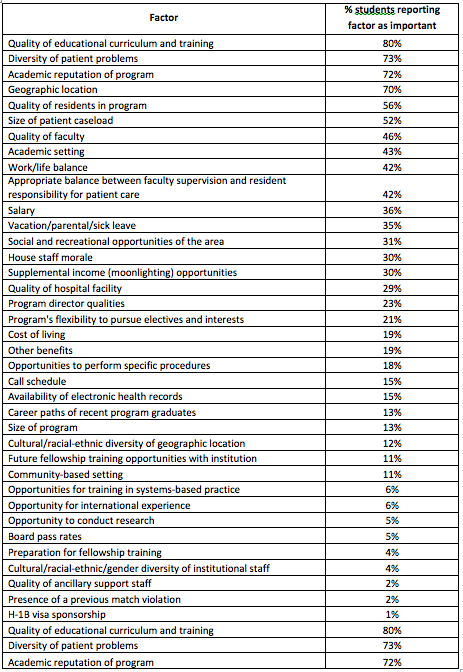For each program you will have general things you want to assess as well as things specific to the individual program that you want to explore.
General Attributes
It is good to come up with a comprehensive list of attributes you want to assess for each program. To figure this out you will need to determine what you want in a residency and associated community. Place for educational excellence. These are three formative years in your training and it is vital that you receive quality education. Some common factors students assess of a residency include:
- Volume of patient contacts – enough to learn and become more efficient without being overwhelmed?
- Diversity of patients – this includes types of patients (peds, OB, adults, etc.), background of patients, types of visits (acute, preventive, chronic disease).
- Supportive learning environment in which the resident is challenged yet has the support structure to learn. Balancing these two will be variable between different residents; you must find a place that will fit your style and needs.
- Hospital and clinic size – will you be more comfortable learning in a small community hospital or in a tertiary care center? In a stand-alone clinic or in an integrated, multispecialty office?
- Collegial learning environment – is the resident part of a team of learning?
- Emotional support – how does the residency prevent burnout and address residents in trouble emotionally and academically?
- Good fit – the feel for the place and the people you meet. Are these people you want to spend three years with? In the end, the general feel fo the place affects deeply the choice of residency. This is an important part of residency selection.
- Graduate success – are the graduates of the program successful and doing what you want to do when you are done?
Some common factors students assess in a community include:
- Social connections – churches, activities
- Needs of children – childcare, schools
- Needs of significant others – employment/educational opportunities
Below is al ist of factors that students who matched in family medicine reported as important to them in ranking programs highly. Use this as a guide to create your own list.

Specific Program Attributes
It’s also good to have some things that are specific to an individual program that you want to explore. To develop this list you first need to do some research:
- Review all the information a program sends you.
- Visit the program’s website – review the program’s mission statement and their goals.
- Research the faculty.
- Research the residents.
- Consider contacting any UW graduates in the program.
To prepare for the individual interview experience:
- Ask for an interview schedule ahead of time if it was not included.
- Ask the program what to expect and what materials to bring for the interview day.
- If you know who will interview you, research those individuals more carefully through the website. Consider searching for them on Pubmed and FMDRL (Family Medicine Digital Resource Library).
Prepare Your Questions
Based on the needs and wants you identified above, brainstorm a list of information you wish to find out during your visit. Prepare a list of questions for residents, faculty, and staff.
- Have a list of different questions for different people. You will want to ask the program director very different questions than you ask the staff.
- Prepare questions you can ask to draw out the information you want from the interviewer.
- Avoid general questions like “What are the weaknesses of the program?” Instead, try to ask about specific information you want to know about the program. For example, “what is the pediatric inpatient volume in the residency” “How many deliveries does a resident typically have at the end of residency?” “How independent is a resident in the inpatient service?” “How is supervision in the clinic done?”
Below is a list of possible questions for each group of people you interact with.
Program Director
- What is the success of graduates: board scores, finding jobs/fellowships?
- Accreditation?
- Status of the program and hospital: Have any house staff left the program?
- Quality of the current residents? Have any left the program recently?
Faculty
- What are the clinical, non-clinical, and administrative responsibilities of the residents?
- How are residents evaluated? How often? By whom? How may they give feedback?
- Are there research or teaching opportunities?
- Do you foresee any changes in the next three years?
Residents
- What contact will I have with clinical faculty?
- How is it working with the faculty?
- What is the average daily workload for interns? Is it varied?
- How much didactic time is there? Does it have priority?
- What types of clinical experiences will I have?
- What is the work schedule? Call schedule?
- What is the patient population I will see?
- Are you happy? Was this a good match for you?
- Do the residents socialize as a group?
- Are there moonlighting opportunities?
- How competitive was it to match to this program?
Staff
- What is the rotation and call schedule like?
- What are the parking and transportation options?
- How does the residency schedule electives and away rotations?
- What is the city/town/area like?
- For residencies that have specific tracks – what are they like?
- What residents and faculty should I talk to about my interest in X (OB, sports med, etc.)?
- While on call, what do residents get in terms of meals and call rooms?
Questions Not to Ask
These are topics you should typically not ask about during the interview. Most of this information will be in the packet they send you or covered in an introductory meeting. If not, they can be addressed in a follow-up email to the program coordinator, who will probably connect you with an HR representative.
- Salary
- Benefits
- Vacation
- Family Leave
Do:
- Your homework before the interview. Know something about the program, the people, and the director.
Don’t
- Select a residency based on their pay rate. If you are truly strapped and can’t live without the difference in pay from one residency to another, only then should this be a consideration. However, when you are out of residency 10 years, the few thousand extra dollars will likely seem much less important than they do at the time of entry into residency. You will certainly feel the pain after residency if you have not met your training needs.
- Fixate on one thing during your interview (one particular accomplishment, one aspect of the program, etc.)
National Residency Matching Program (2011). Results of the 2011 NRMP Applicant Survey by Preferred Specialty and Applicant Type. 27-28. Retrieved from http://www.nrmp.org/data
